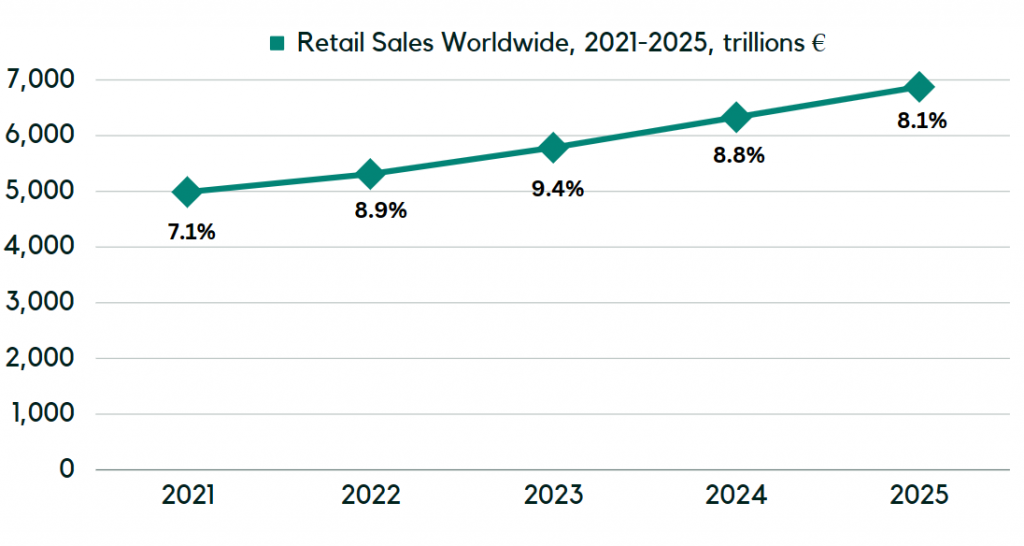
07 Dec Major IT challenges E-commerce faces for the Holiday Shopping season
The rapid expansion of internet usage and technological advancements have significantly increased the global online consumer demographic. This increase in online users and retail e-commerce sales has created a greater demand for quick internet access, accelerating the development of digital business transformation.
According to Insiderintelligence annual worldwide retail e-commerce sales forecast, predictions for 2023 indicate continued growth in online sales. The report forecasts an 8.9 % increase in 2023 compared to 2022.
In 2022, nearly 19% of global retail sales were conducted through e-commerce platforms, a figure that is projected to rise to 21.2% by 2024. This anticipated growth underscores the increasing importance of e-commerce in the retail sector and the need for retailers to have robust technology systems to meet the rising demand and capitalize on potential profits.

As a result, the significant increase in website traffic poses challenges to IT infrastructure, arising as server overloads and latency issues, eventually resulting in prolonged server outages caused by a massive volume of visitors. Failure to proactively address these challenges may negatively affect e-commerce businesses, including potential revenue loss and reputational damage.
According to HITC research, in 2022, the Nike website was down for shoppers, and many noted that the site had been down “all day’’ thus not allowing them to buy anything. The message displayed on the website reads: “We’re aware of an issue impacting access to Nike.com. Thank you for your patience.”
Why prepare your e-commerce infrastructure for high sales season?
Increased IT infrastructure and system usage during peak sales requires high availability and performance. Customers may abandon their shopping carts or choose alternative platforms due to failures, posing a significant risk of revenue loss for affected brands.
’’E-commerce businesses must invest in resilient IT infrastructure and suitable hardware and software solutions to mitigate risks. Acquire adaptable physical servers to process and store large amounts of data efficiently. Strict data protection measures and establishing secure Internet information transmission mechanisms to secure customers’ personal and financial information,’’ suggests A. Gailitis, the CEO of the data center operators DLC and DEAC.

Addressing Key Challenges in E-commerce & Retail During Peak Traffic Loads
Cyberthreats
As online activity increases during peak seasons, e-commerce faces increased cybersecurity threats: DDoS, Web-Skimming, Bot attacks, Ransomware, Data breaches, or personal data leakage. Businesses must prioritize the protection of their websites and customer data against potential cyber-attacks, particularly during high-traffic events such as Black Friday or Christmas.
Server errors
A common cause of website crashes can occur during peak active sales season, primarily if the provider hosts multiple eCommerce platforms, resulting in issues such as HTML Error 500; this problem can be triggered by severe weather-related outages, poorly designed website or cloud infrastructure, and can be identified by monitoring the hosting or cloud provider’s status, with prevention measures involving migrating to the cloud for storage.
IT Infrastructure Scalability
During peak seasons, the primary challenge is rapidly scaling IT infrastructure to meet customer demand. It is critical to access required infrastructure capacity quickly and affordably, and cloud computing technology emerges as a valuable solution, providing enhanced flexibility and security for online stores.
Website Performance
During peak periods, the increase in traffic poses a significant challenge to website performance. Businesses must optimize their websites for speed and performance to ensure a seamless user experience and reduce crashes and slow loading times.
DLC and DEAC data centers’ experts’ advice on how to tackle peak IT performance
Pre-inspect your tech stack & infrastructure: Before the peak season, review your network configuration, server hardware, software, and operating systems. Check for any newly installed applications or programs and ensure that all systems are up to date with the latest patches and updates.
Plan & predict necessary resource usage: Create a plan that maps out your expected traffic and peak hours. Test your bandwidth ahead of time to ensure it can handle the load. Add extra storage space and plan enough backup power to support your systems. Train your team to use new tools and applications and review security protocols.
Perform Traffic and Volume Analysis: Analyzing historical trends of your website traffic and order volume based on data gathered year-over-year will help you set and meet the right expectations of your customers during the holiday season.
Practice Good Habits: Optimize images for a fast eCommerce site. It’s essential that visitors can shop uninterrupted during the holiday season, but you might need to push changes to your production environment during this time. Configure your project so that the customer experiences zero downtime during these deployments.
Protect your site: As hackers become more sophisticated, merchants must run the latest software, especially as we head into peak season. Bad actors know that businesses are distracted during busy periods and often use this as an opportunity to strike.
Testing and Optimizing IT Infrastructure: To ensure efficient operations during peak periods, IT infrastructure must be thoroughly tested in advance. This includes assessing site performance, page load time, and server capacity.
At DLC and DEAC, we recognize the critical importance of maintaining a strong and scalable IT infrastructure, particularly during peak sales seasons. Our advanced data center infrastructure has ISO/IEC 27001:2013, ISO 22301:2019, ISO 50001:2018, and PCI DSS certifications, ensuring the highest security and data protection standards.
DEAC and DLC offer dedicated server rental, colocation, cloud services, and customized IT solutions to meet diverse business needs. We invite you to investigate the challenges of our offerings, speak with our experts, and strengthen your website against downtime during the ‘golden’ last months of the year. With DLC and DEAC on your side, you can confidently navigate the complexities of peak seasons, ensuring a smooth and profitable experience for your customers.




